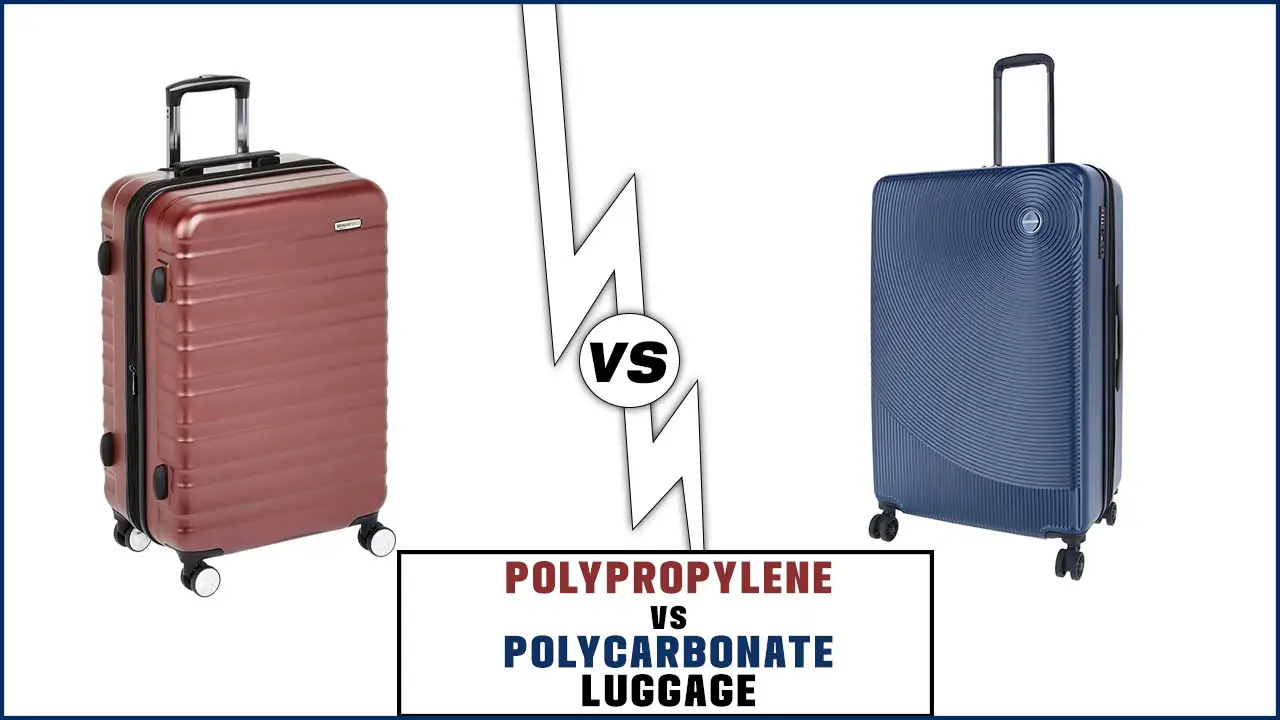Polypropylene and polycarbonate are two popular materials used in the manufacturing of luggage. Comparing these two materials is important to determine which one best suits your needs and preferences.
Polypropylene is known for its lightweight and durable properties, making it an excellent choice for frequent travelers who want a sturdy yet lightweight suitcase. On the other hand, polycarbonate offers superior impact resistance, making it ideal for those who prioritize protecting their belongings.
You can decide based on weight, durability, and protection by comparing these two materials. Understanding the differences between polypropylene and polycarbonate will help you choose the luggage that best meets your travel requirements. Here, we will dive into polypropylene vs polycarbonate luggage. Whether you’re a frequent traveler or an occasional vacationer, here will help you make an informed decision and ensure that your luggage stands up for all your adventures.
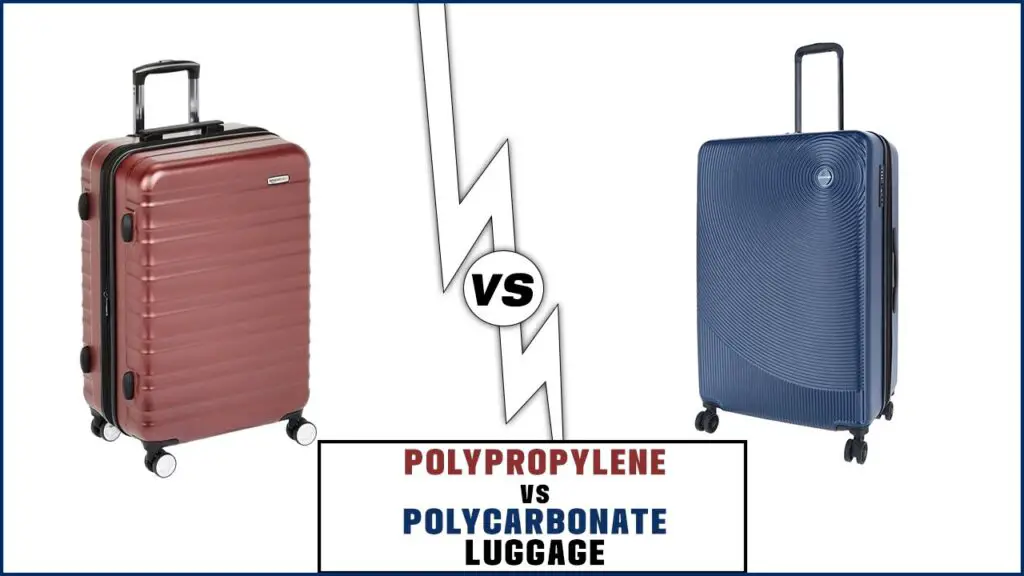
Making A Choice: Polypropylene Vs Polycarbonate Luggage

When deciding between polypropylene and polycarbonate luggage, several factors come into play. First, let’s consider durability. Polypropylene is known for its high impact resistance, while polycarbonate is extremely durable and can withstand rough handling. Next, weight is an important consideration. Polypropylene luggage is generally lighter than polycarbonate, making it easier to carry.
Additionally, flexibility is a key factor. Polycarbonate luggage is more flexible, allowing it to absorb impact and return to its original shape. Furthermore, scratch resistance should be taken into account. Polycarbonate is more resistant to scratches and scuffs compared to polypropylene.
Lastly, price plays a crucial role. Polypropylene luggage is usually more affordable than polycarbonate, making it a budget-friendly option. So, when choosing between the two, consider these factors to find the best option that suits your needs. Here, we will discuss more in detail polypropylene vs polycarbonate luggage.
Origin And Common Uses Of Polypropylene
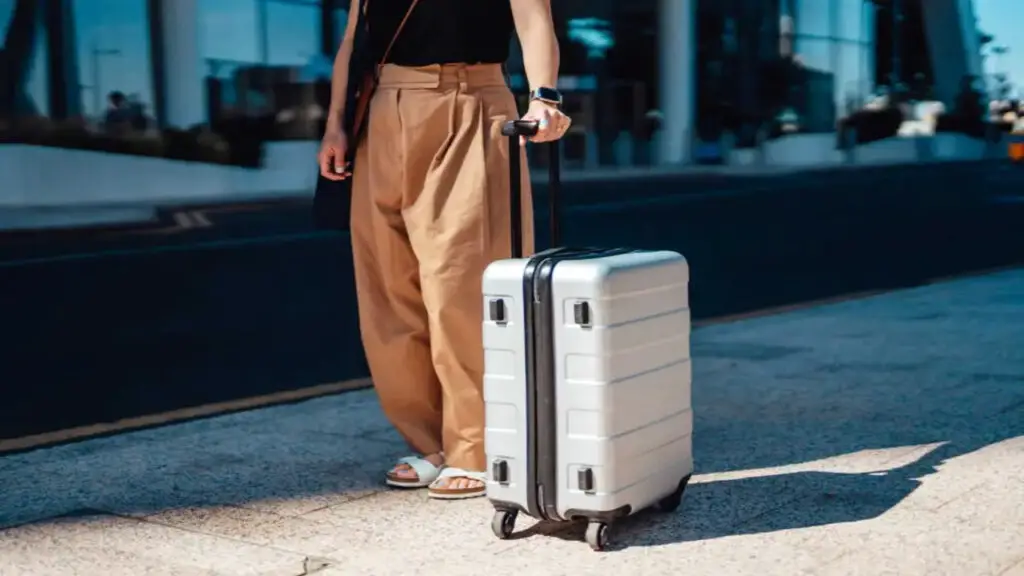
Polypropylene, a thermoplastic polymer derived from propylene gas through a polymerization process, finds extensive use in various industries. One such industry is luggage manufacturing, where polypropylene is favored for its lightweight yet durable properties.
Polypropylene luggage is resistant to chemicals, moisture, and impact, making it an ideal choice for frequent travelers who may encounter rough handling. The material often features a matte finish and is available in various vibrant colors, adding a touch of style to the functionality.
Origin And Common Uses Of Polycarbonate
Polycarbonate, a durable and lightweight material, finds common use in producing bulletproof glass and safety goggles. Derived from bisphenol A (BPA), this thermoplastic polymer boasts high impact resistance and transparency, making it ideal for products requiring strength and visibility. Polycarbonate’s versatility extends beyond safety gear, as it is also widely used in producing CDs, DVDs, and electronic device components. Its durability and flexibility make it a favored choice for luggage manufacturers, providing travelers with dependable, long-lasting suitcases.
Features Of Polypropylene Luggage
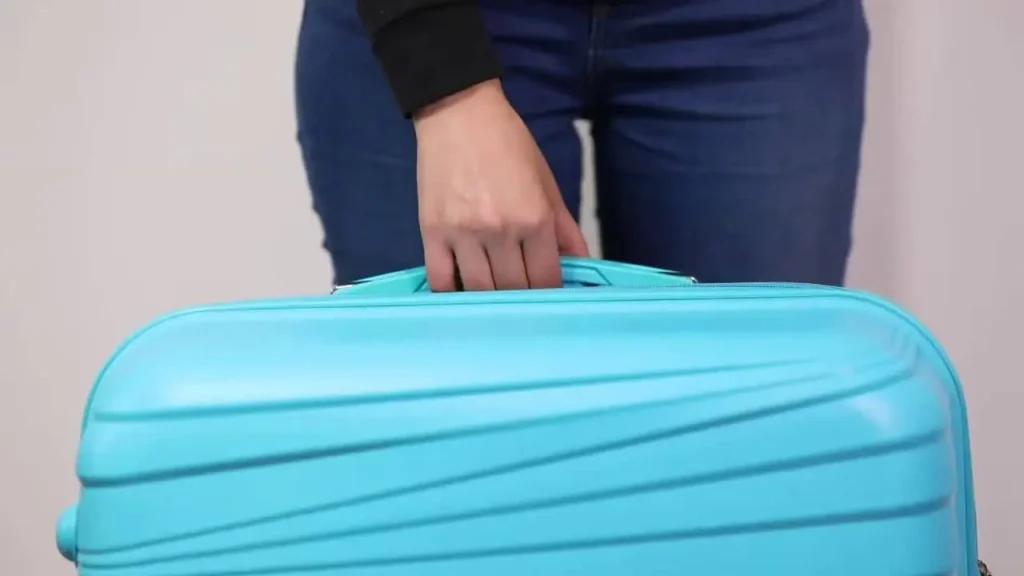
Polypropylene and polycarbonate luggage possess distinct characteristics that cater to different travel needs. Polypropylene luggage is favored by frequent travelers due to its lightweight and durable nature, making it easy to carry and resistant to wear and tear. Here are some key features of polypropylene luggage:
- Durability: Polypropylene is known for its exceptional strength and durability, making it resistant to impacts, scratches, and general wear and tear.
- Lightweight: Polypropylene luggage is lightweight despite its robustness, allowing travelers to pack more without exceeding weight limits.
- Water-resistant: Polypropylene protects your belongings from moisture and rain while traveling.
- Flexibility: Polypropylene luggage can withstand bending or deformation without breaking or losing shape.
- Security: Many polypropylene suitcases come with built-in TSA-approved or combination locks for added security during travel.
- Easy to clean: The smooth surface of polypropylene makes it easy to wipe clean, ensuring your luggage stays looking fresh and new.
- Vibrant colors and designs: Polypropylene luggage often comes in various vibrant colors and stylish designs, allowing travelers to express their personal style while on the go.
With its strength, lightness, and style, polypropylene luggage is an excellent choice for frequent travelers who prioritize durability and functionality.
Features Of Polycarbonate Luggage
Polycarbonate luggage is a popular choice for travelers due to its durability and lightweight construction. On the other hand, polycarbonate luggage is known for its impact resistance and strength, making it suitable for rough handling or outdoor adventures. Here are some key features of polycarbonate luggage:
- Impact-resistant: Polycarbonate is known for its high impact resistance, making it withstand rough handling during travel without cracking or breaking.
- Lightweight: Polycarbonate luggage is significantly lighter than other materials like aluminum or hard-sided suitcases, allowing for easier maneuverability and less strain on the traveler.
- Flexibility: Polycarbonate has a certain degree of flexibility, which allows the luggage to absorb impact and return to its original shape, reducing the risk of permanent damage.
- Scratch-resistant: The hard outer shell of polycarbonate luggage is resistant to scratches and scuffs, keeping it looking new even after frequent use.
- Security features: Many polycarbonate suitcases come with built-in TSA-approved or combination locks, providing extra security for your belongings.
- Variety of colors and designs: Polycarbonate luggage is available in various colors and designs, allowing travelers to express their style while easily identifying their bags at baggage claim.
With its strength, lightness, and style, polycarbonate luggage is an excellent choice for frequent travelers seeking reliable and fashionable travel companions.
Weight Comparison
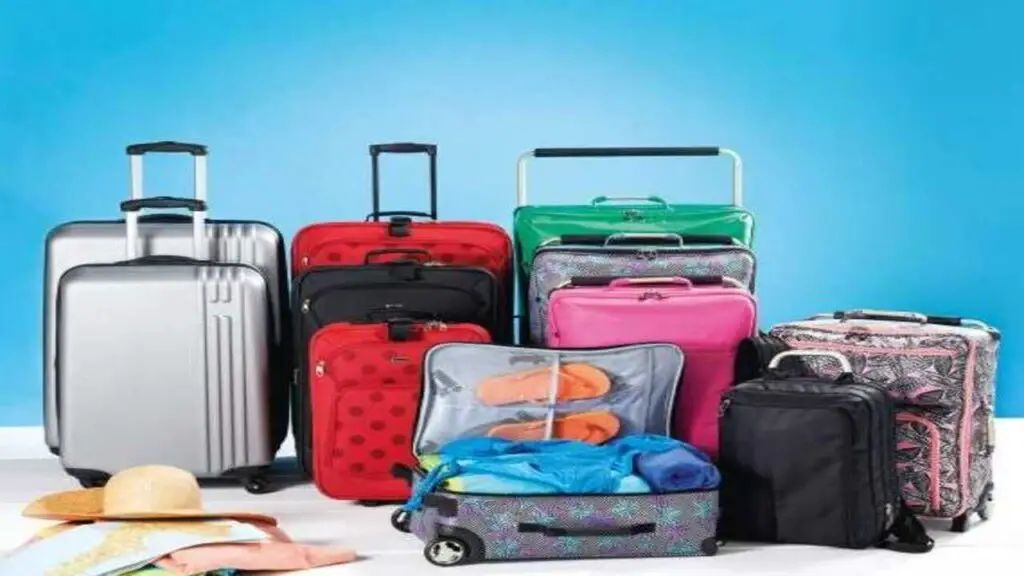
One important factor to consider when comparing polypropylene and polycarbonate luggage is weight. Polypropylene luggage tends to be lighter than polycarbonate luggage. Although polycarbonate luggage may be slightly heavier, it offers superior durability.
The weight of the luggage plays a role in your overall travel experience and ease of maneuverability. It’s also important to consider the weight concerning airline restrictions and your personal preferences. Both materials have their advantages, so choose based on your specific needs.
Durability Factor
Regarding the durability factor, both polypropylene and polycarbonate luggage are excellent choices. Polypropylene luggage is popular for its high durability and resistance to impact and scratches. On the other hand, polycarbonate luggage is also very durable and can withstand rough handling during travel.
While both materials offer excellent durability, polypropylene is generally more rugged and long-lasting. Polycarbonate luggage, on the other hand, is known for its flexibility and ability to absorb impact, making it less likely to crack or break. Remember to consider the overall construction and quality of the luggage when assessing durability.
Resistance To Environmental Factors
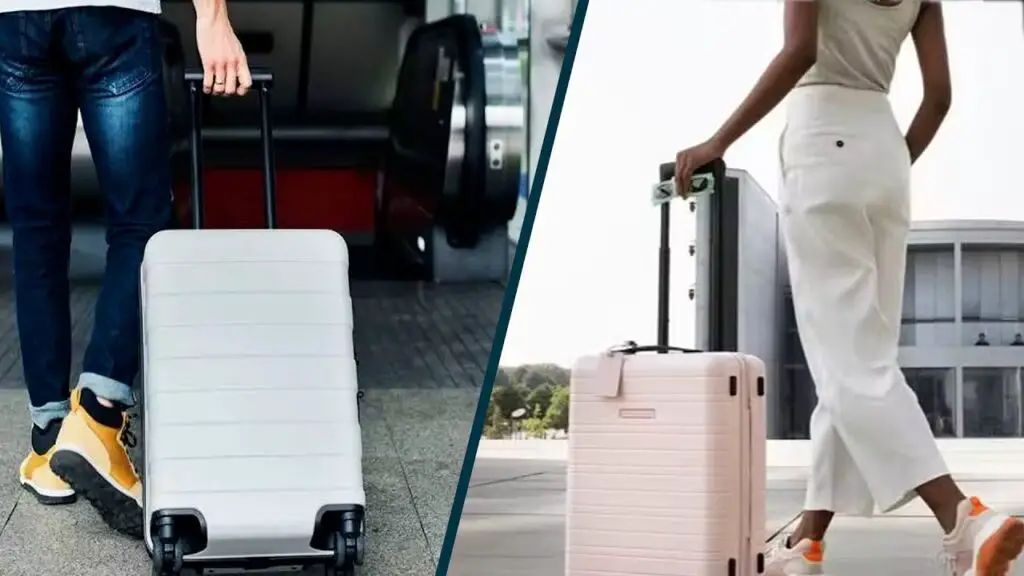
Both polypropylene and polycarbonate luggage have their advantages regarding resistance to environmental factors. Polypropylene offers excellent moisture resistance, making it perfect for humid climates. On the other hand, polycarbonate is highly resistant to impact and can withstand rough handling during travel.
Both materials resist UV radiation, ensuring your luggage won’t fade or discolor over time. Polypropylene has the edge regarding chemical resistance, making it a better choice if you frequently travel with hazardous substances. Meanwhile, polycarbonate luggage is more resistant to extreme temperatures, making it suitable for hot and cold climates.
Pros And Cons Between Polypropylene And Polycarbonate Luggage
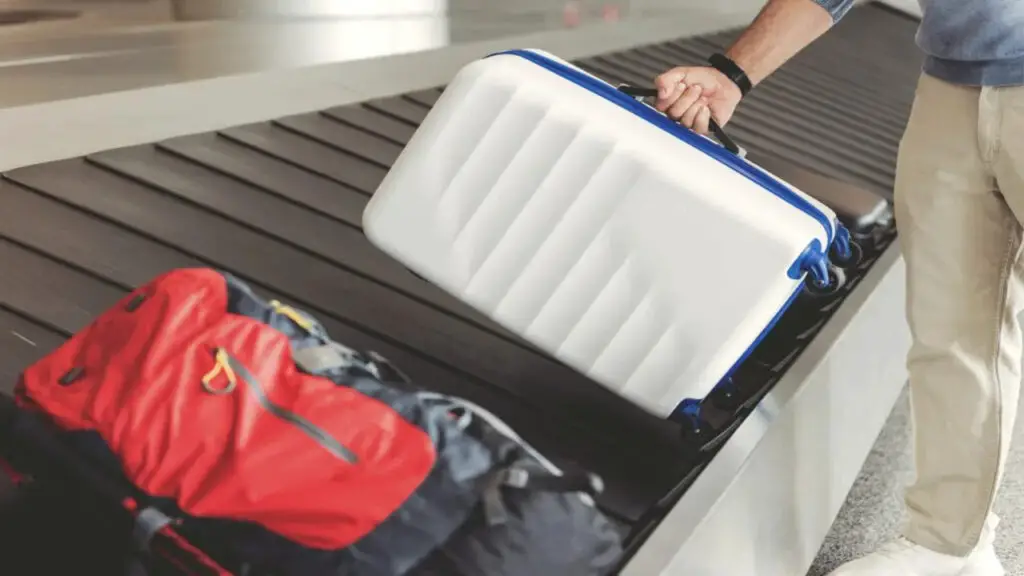
Polypropylene and polycarbonate are popular luggage choices, each with pros and cons. Polypropylene is lightweight and durable, making it ideal for frequent travelers. When it comes to choosing between polypropylene and polycarbonate luggage, there are several pros and cons to consider:
Polypropylene:
Pros: Lightweight, durable, and resistant to impact and scratches.
Cons: Can become brittle in extreme temperatures and may show signs of wear over time.
Polycarbonate:
Pros: Extremely durable and impact-resistant, can withstand harsh handling and rough transportation.
Cons: Slightly heavier than polypropylene, may show scuffs and scratches more easily.
Both materials have advantages and disadvantages, depending on your specific needs and preferences. If you prioritize lightweight luggage that can withstand everyday use, polypropylene might be the better option. On the other hand, if durability is your main concern and you don’t mind a slightly heavier suitcase, polycarbonate could be the way to go.
How Does Material Choice Affect Luggage Lifespan?
The choice of material has a significant impact on the lifespan of luggage. Polypropylene, known for its durability and resistance to impact and abrasion, is ideal for frequent travelers. On the other hand, polycarbonate is also durable and lightweight but may be less resistant to scratches. Regardless of the material, proper care and maintenance can extend the lifespan of your luggage.
Cost Considerations For Polypropylene And Polycarbonate Luggage
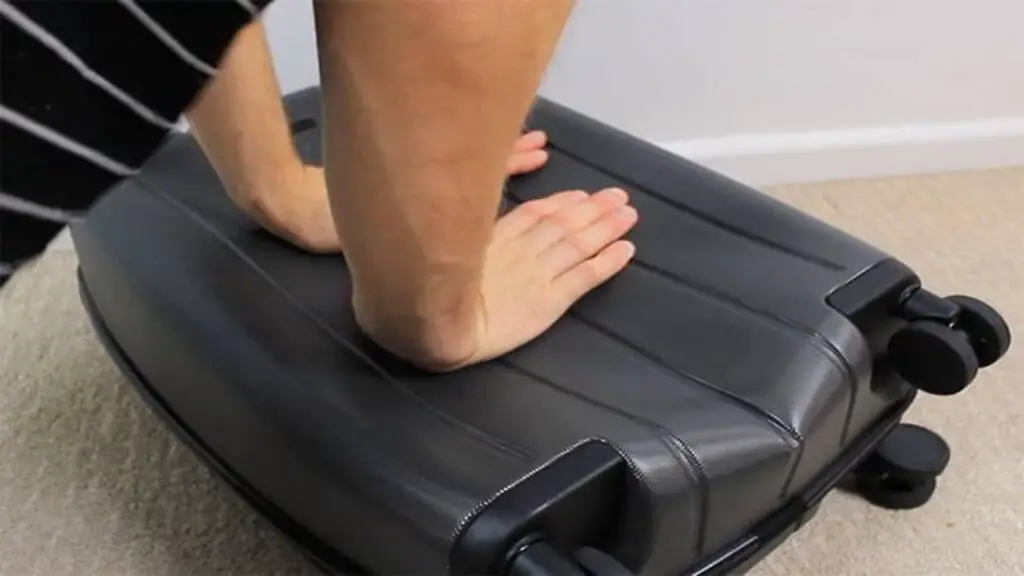
Several factors come into play when considering the cost of polypropylene vs. polycarbonate luggage. Polypropylene luggage is generally more affordable than its polycarbonate counterpart. However, it’s important to note that polycarbonate luggage tends to be more durable and resistant to scratches.
While polypropylene luggage may have a lower weight capacity, polycarbonate luggage is often more lightweight, making it easier to maneuver and carry. Ultimately, the choice between polypropylene and polycarbonate luggage should be based on your budget and travel needs.
Initial Purchase Cost
When comparing polypropylene and polycarbonate luggage, one of the key factors to consider is the initial purchase cost. Polypropylene luggage tends to be more affordable upfront than polycarbonate options. This is because polycarbonate luggage is known for its durability and impact resistance, often resulting in a higher initial purchase cost.
Considering your budget and long-term travel needs is important when deciding between these two materials. While polypropylene may be cheaper initially, the longevity of polycarbonate luggage can make it a cost-effective choice in the long run. Additionally, the initial purchase cost of luggage can vary depending on factors such as brand, size, and additional features.
Long-Term Cost Effectiveness
When considering the long-term cost-effectiveness of luggage materials, it’s important to weigh the upfront cost against the durability and lifespan of the product. While polypropylene luggage may have a lower initial price tag, polycarbonate luggage offers superior durability and can withstand rough handling without showing signs of wear and tear.
This means that while the upfront cost of polycarbonate luggage may be higher, its long-lasting performance can save you money in the long run by avoiding frequent repairs or replacements. Investing in polycarbonate luggage ensures your belongings are protected for future trips.
How To Choose Between Polypropylene And Polycarbonate Luggage?

When choosing between polypropylene and polycarbonate luggage, it is important to consider your specific travel needs and personal preferences. Assess the level of protection required for your belongings, comparing the weight of both materials to ensure ease of use during your travels.
Additionally, consider your budget and prioritize durability, flexibility, or lightweight construction based on your preferences. It is also essential to evaluate each material’s impact and scratch resistance to ensure the longevity and protection of your belongings. Considering all these factors, you can make an informed decision that best suits your travel requirements.
What’s The Best Choice For Frequent Travelers?

For frequent travelers, choosing between polypropylene and polycarbonate luggage depends on their specific needs and preferences. Polypropylene luggage is known for its lightweight durability and ability to withstand scratches and impacts. On the other hand, polycarbonate luggage also offers excellent impact resistance while remaining lightweight. Both materials have advantages, so it’s important to consider factors such as budget, travel frequency, and desired features when deciding.
Conclusion
When deciding between polypropylene and polycarbonate luggage, it’s important to consider your specific needs and preferences. Polypropylene luggage is lightweight and durable, making it a great choice for frequent travelers who prioritize ease of use and maneuverability. On the other hand, polycarbonate luggage offers superior impact resistance and is more likely to withstand rough handling during travel.
It is also a good choice for individuals who value long-term durability and are willing to invest in a higher-quality product. Ultimately, the decision comes down to your priorities and budget. Consider these factors carefully to make an informed choice that suits your travel style and requirements. I hope the above outline on polypropylene vs polycarbonate luggage will help you to choose the right luggage for your comfortable travel.
Frequently Asked Questions
1.Which Is Better, Luggage, Polypropylene Or Polycarbonate?
Ans: Regarding luggage, the choice between polypropylene and polycarbonate depends on your needs. Polypropylene is more affordable and lightweight, while polycarbonate offers better durability and impact resistance. Consider what matters most to you before making a decision.
2.Is Polypropylene A Good Material For Luggage?
Ans: Polypropylene is a popular choice for luggage due to its durability and lightweight nature. It offers resistance to impact, abrasion, and water, making it suitable for travel. However, it may lack the same level of flexibility as materials like polycarbonate.
3.What Is The Best Material For Checked Luggage?
Ans: Regarding checked luggage, the best material depends on personal preferences and travel needs. Both polypropylene and polycarbonate are popular choices. Polypropylene offers durability and impact resistance, while polycarbonate is lightweight yet strong.
4.Is Polypropylene Luggage Good Or Bad?
Ans: Polypropylene luggage is lightweight and durable, making it popular among frequent travelers. While it may not offer the same scratch resistance as other materials, its impact resistance makes it ideal for travel.
5.What Are The Differences Between Polypropylene And Polycarbonate Luggage?
Ans: Polypropylene and polycarbonate luggage have distinct differences. It is lightweight and flexible, while polycarbonate offers superior durability and impact resistance. Polypropylene luggage may be more affordable, while polycarbonate luggage often has a sleeker appearance.
